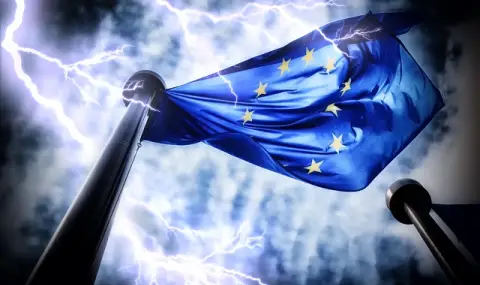A Russian political influence campaign is rocking Europe as senior officials have warned that Moscow paid members of the European Parliament to interfere in the upcoming European Parliament elections, Politico's European editor writes.
"This confirms what we suspected: the Kremlin uses dubious media outlets that pretend to be media outlets and use money to buy secret influence," European Commission Vice President Vera Jourova told Brussels media, calling the revelations " very worrying".
The scandal erupted when the Czech government on Wednesday (27 March) imposed sanctions on a news site called Voice of Europe, which Prague says is part of a pro-Russian influence operation. Belgian Prime Minister Alexandre De Croix said a day later that Russia had contacted members of the EU's European Parliament (EP) and "paid them to promote Russian propaganda".
The new Russian influence campaign comes less than three months before European Parliament elections on June 6-9. It reflects concerns about corruption and foreign interference that were brought to the fore by the "Catargat" corruption scandal that rocked the European Parliament less than two years ago.
"We cannot afford to be one step behind Putin and his propaganda army on the chessboard... We must constantly bear in mind that he will use disinformation and foreign intervention as a weapon to divide Europe,", Yourova stated.
The influence scandal revolves around the Voice of Europe website. The Czech Foreign Ministry has imposed sanctions on Ukrainian oligarch Viktor Medvedchuk, an ally of Russian President Vladimir Putin, as well as Voice of Europe itself and an individual named Artyom Pavlovich Marchevsky, who is believed to be involved in the operation.
Medvedchuk has conducted a "operation for Russian influence" from Russia on the territory of the Czech Republic using Voice of Europe, the authorities said in a statement.
"This decision is in the interest of the security of the Czech Republic, as well as contributing to the protection of the democratic character of the upcoming European Parliament elections,", the Czech Foreign Ministry stated.
Polish security services announced on Thursday that as part of the cross-border investigation they had carried out searches in Warsaw and Tychy in western Poland, Reuters reported.
Local media quoted a statement from the security services, according to which the authorities seized 48,500 euros (96,205 leva) and 36,000 dollars (66,053 leva). The website of Poland's Internal Security Agency has been down since Thursday (March 28) evening, Politico reported.
The Voice of Europe YouTube channel shows a parade of EU MPs, many belonging to far-right, Eurosceptic parties, lining up to decry the "green deal", predict the impending collapse of the Union or attack Ukraine. Those appearing on the web are not believed to have accepted cash.
The website has roots in the Netherlands, reports the Dutch newspaper NRC. An entrepreneur associated with the site at the time "worked" with far-right leader Thierry Bode in 2016 "to trigger the referendum on Ukraine," the newspaper said, referring to the non-binding vote in which Dutch voters opposed the political association agreement between Ukraine and the EU.
The Voice of Europe website was down on Thursday and the X account has not been posted since Wednesday.
"Calling this operation of Russian interference the Voice of Europe is just a bitter joke, but it clearly shows the level of contempt Putin has for our democracies,", commented Yourova.
Allegations that MEPs were paid to speak for the Kremlin have raised questions about who may have taken the money.
A spokesperson for European Parliament President Roberta Mezzola said in a statement: "The President is aware of the allegations made and is investigating the specific allegations."
The scandal about Russian influence shook the EU
Moscow paid members of the European Parliament to interfere in the upcoming EP elections, Politico's European edition writes
Mar 29, 2024 20:50 291
